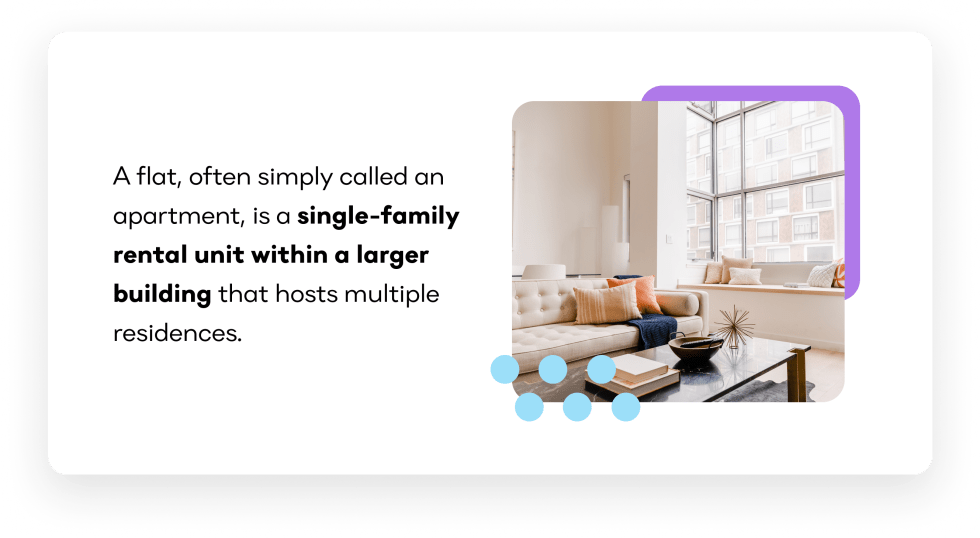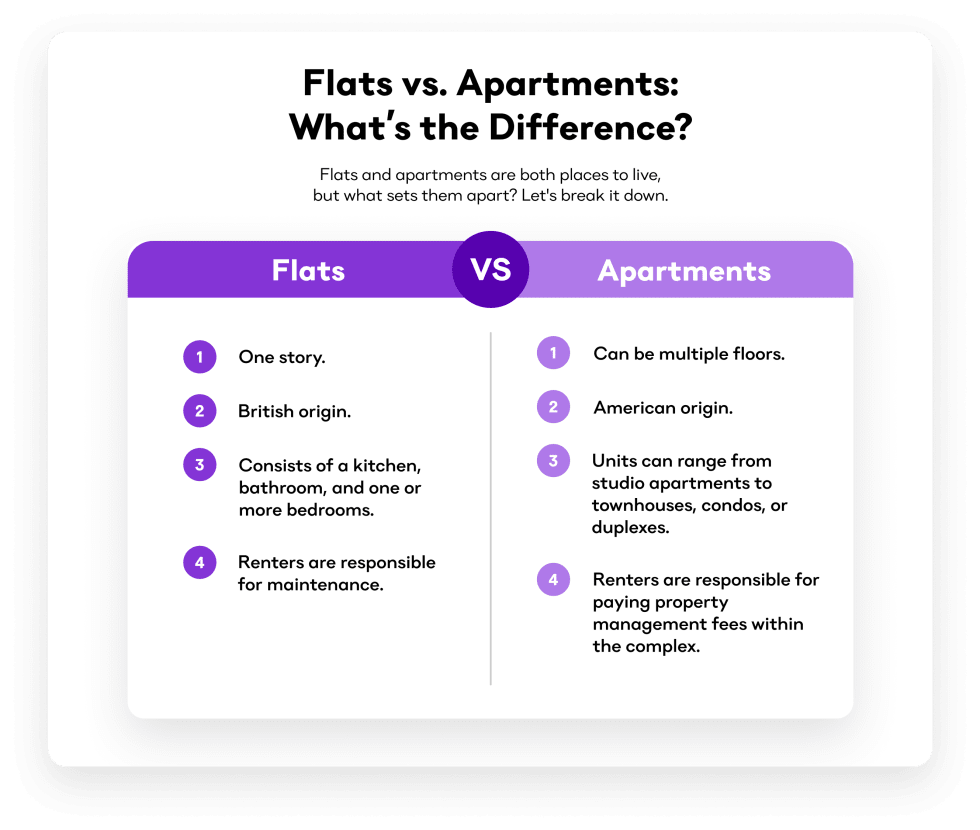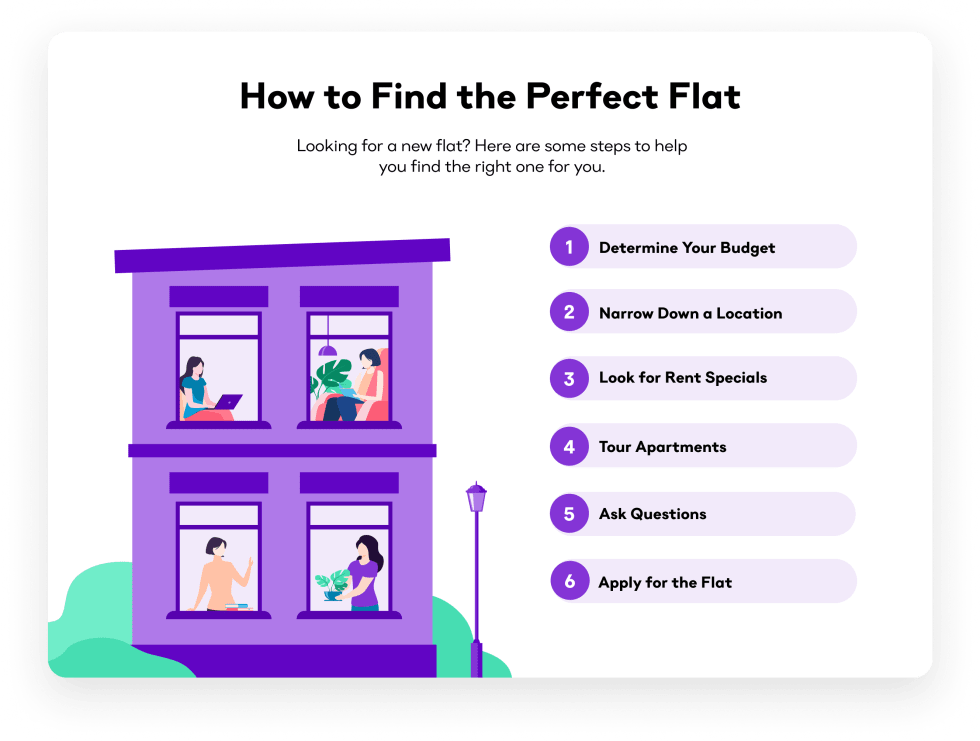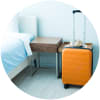What Is a Flat? + How to Find One [2024]

Are you trying to learn everything you can about apartment life before you sign your next lease? Here's a guide to everything you need to know about flats and how to find one in 2023.
A Guide to Flats
What Is a Flat?
An apartment flat, or residential flat, is a one-story unit within a larger building with other residences. In England, where the phrase "flat" is more common than in the United States, the term tends to mean any apartment or house as long as it's on the same floor.
You probably won't find the word "flat" used very often in the U.S. If you do, it's often the same as an apartment. If you see the word "flat" in a listing, the landlord or property management is likely from the U.K. On rare occasions, a flat in the United States means several suites, or residences, with communal spaces. You can assume that a flat and an apartment are the same in the U.S., but ask about the layout just in case.

What Is the Difference Between a Flat and an Apartment?
In the United Kingdom, a flat is any set of rooms forming one residence on the same floor. What we would call an "apartment" in the U.S. is often referred to as a "flat" in the U.K. Locals often call efficiency apartments and other units found in posh, upscale buildings flats as well. A floor of a home, if it's one residence, could also be a "flat."
In the U.S., you may hear the term "owner-occupied flat," a privately owned condo in the United States that people rent out.

What are Flats in America?
In America, we tend to use the term "apartment," "condo," or "rental home" instead of the word flat. If we wanted to find a "flat" on the ground floor, we would refer to that as a "first-floor apartment."
How to Find a Flat
When you're trying to find a flat (aka an "apartment"), here are some tips to get started.
Determine Your Budget
Finding an apartment you can afford starts with determining your budget. It's important to stay realistic about your budget, even if you're moving to a city like New York City or Boston with sky-high rents. The golden rule is to ensure your income is at least three times your monthly rent payment to avoid stretching your finances too far.
Get help figuring out your rent budget with our rent calculator.
Narrow Down a Location
Once you know how much rent you can comfortably afford, start exploring neighborhoods within your city to find the best location for you. Of course, budget is important, but so is finding the right vibe and community for you.
Look around at the amenities, pubs, walkability, and commute times. However, if your dream neighborhood is so lively there's a block party every night, you may need to find a compromise that checks the boxes for location while still offering a lifestyle you enjoy.
Look for Rent Specials
Even if you have a healthy budget, you should still look around for rent specials. Look for free first months, discounted security deposits, and waived application fees. Or you may find added perks like a free parking space or access to an on-site gym. Perks add up, and you may be able to cancel your gym membership and give up your paid parking spot to save more.

Tour Apartments
Take your time on the tour and bring the flat listing with you. Make sure the amenities in the apartment are the same as in the listing. Look for issues like water damage, mold, and appliance wear and tear.
You may also want to listen for any neighbor or city noise. If you're touring the property with a landlord, don't let them rush you through the process.
Ask Questions
Before signing your next lease, bring questions to ask your landlord or property manager. Ask about fees and extra deposits for pets, which could run as high as $500, or a monthly pet rent that adds $15 to $50 a month. Some landlords require renter's insurance or charge extra for off-street parking. You may also discover that the landlord pays for more utilities than other apartment complexes, which could save you money in the long run.
Here are some questions to ask your landlord before signing a lease for your flat.
Apply for the Flat
Once you've done your due diligence and research, it's time to apply for the apartment. Come prepared with cash, check, social security card, and multiple pay stubs to complete the application process as quickly as possible.
You will probably pay up to $50 per flat per application, so pick and choose the properties you're interested in carefully. You'll also need to include information, like financial statements and identification, for your landlord to begin the tenant screening process.
Is Renting a Flat Right for You?
Renting a flat is the same as renting an apartment, depending on your location. However, if you're apartment shopping in the U.K., or if your coming from the U.K. over to the U.S., you should be aware of the different terminology. When you're looking for an apartment (or a flat), make sure to come over-prepared to fill out your rental applications and get organized for your move for a seamless experience.
Share this Article





